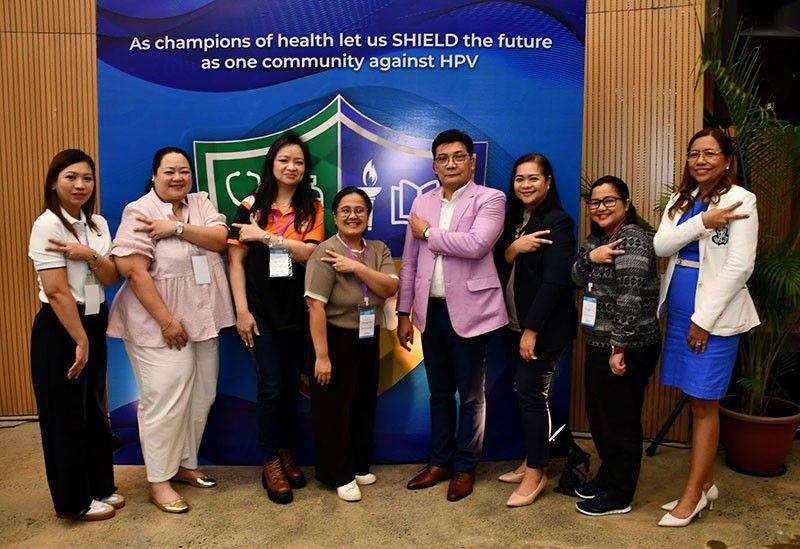
Upgrade to High-Speed Internet for only ₱1499/month!
Enjoy up to 100 Mbps fiber broadband, perfect for browsing, streaming, and gaming.
Visit Suniway.ph to learn
Did you know that HPV or human papillomavirus causes more than just cervical cancer? The virus can also be associated with anal cancer, anal warts, and the incidence of head and neck carcinomas. That said, women aren’t the only ones at risk of getting infected. Men, too!
“HPV is a common virus and has around 100 types. Out of 100, 30 to 40 types can cause genital conditions for both females and males,” explained Dr. Socorro Bernardino, immediate past president of Asia and Oceania Society of Pediatric and Adolescent Gynecology. “Depending on your immune system, some of the HPV types — that cause infection or conditions in the genitalia — clear on their own.”
However, if the virus remains persistent, HPV can turn into cancer in about 10 to 15 years.
HPV is a silent killer. You will not know you have it once the symptoms start to manifest.

#OneCommunityAgainstHPV: (from left) Athlete and cervical cancer survivor Belay Fernando Dela Cruz, Philippine Infectious Disease Society of Obstetrics and Gynecology president Dr. Martha Aguilar-Aquino, Philippine Academy for Physicians in School Health Inc. treasurer Dr. Dr. Analyn Paterno, Philippine Foundation for Vaccination board member Dr. Maria Cristina Alberto, Miriam College HIgh School Grade 7 parent officer Dr. Jill Estabillo, and host Niña Corpus
Schools as hubs for health
And that’s also the reason why children — nine years old and up — are recommended to start their vaccination journey. Children, aged nine to 14 years old, need two doses, while those who are 15 and above need three doses to complete the cycle.
“The ideal time for HPV vaccination is before sexual debut,” said Dr. Bernardino in a recorded message addressed to educators, parents, healthcare professionals and policymakers during the first HPV Summit for Private Schools held recently at Miriam College in Quezon City.
The event, “One Community Against HPV: Schools and Families Championing Health Through Immunization,” is aimed at addressing the urgent need for HPV vaccination among school-aged children.
For parents who are still apprehensive in getting their children vaccinated, Dr. Migo Mantaring, director, Bureau of Learner Support Services, DepEd, assures them that “vaccination is safe, effective, and life-saving.
“It is one of the powerful tools we have in preventing deadly diseases like cervical cancer,” he stresses. “HPV vaccination can prevent up to 90 percent of HPV-related cancers, yet many learners are still unable to receive this protection due to misconceptions, community resistance, or lack of access to school health services.”
Schools are not just places for learning. These are communities where health behaviors are shaped, where preventive interventions are introduced, and where lifelong habits are formed.
Ensuring that learners have access to vaccines in schools means addressing multiple layers of barriers.
“From dispelling myths to providing a trusted space where children and parents feel confident in making the right health choice,” Dr. Manataring adds.
While the Department of Health (DOH) and the Department of Education (DepEd) have long implemented school-based immunization programs in public schools, private institutions have fewer opportunities to participate.
The summit sought to close this gap by encouraging private schools to integrate HPV vaccination into their health programs, ensuring that all students — regardless of school type — are protected against HPV-related diseases.
“By bringing together educators, healthcare providers, and community leaders, we are fostering a network of support that empowers women and girls to lead healthy, fulfilling lives.” says Trixie Marie Sison, vice president for academic affairs at Miriam College. “This summit serves as a powerful reminder that investing in the health of every individual is essential for the holistic development of our society.
The Catholic Educational Association of the Philippines-NCR (CEAP NCR)also aired its support for the HPV immunization program in public and private schools.
“The program is more than about health protection. It’s about creating a safe environment for students to thrive,” says Dr. Noel Racho, chair of the administrative services committee, CEAP NCR. “As we all know, not every student has the same access to healthcare. By offering the HPV vaccine through the school system, which I think is the main objective of MSD and Miriam College, we ensure that every student has the opportunity to be protected.”

Partners in health: Educators, parents and healthcare professionals stand united in advocating HPV vaccination.
What DepEd is doing
The Department of Education (DepEd), under the able leadership of Secretary Sonny Angara, is steadfast in advancing reforms that integrate health into the very fabric of our education system.
“One of the reforms that we would like to share and provide updates for is the institutionalization of school-based health services,” shares Dr. Mantaring. “We are in the process of finalizing a joint administrative order on the operationalization of school and nutrition health services, which delineates clear laws for DepEd, DOH, and LGUs to the purview of the Department of Interior and Local Government (DILG) in the delivery of these health services.”
This policy formally integrates school health services into the broader local health system, ensuring that schools and LGUs share responsibility in delivering health interventions. Under this framework, school clinics aren’t just isolated units.
“They are part of a coordinated network linked to local health offices, allowing better referrals, improved service delivery and more sustainable healthcare support for learners and school personnel,” Dr. Mantaring explains.
DepEd is also actively working with PhilHealth to establish a school health benefit package. This initiative seeks to provide prospective payments to school clinics, allowing them to deliver priority preventive health services, which include immunization directly in schools, making healthcare more accessible for our learners. These prospective payments will help increase physical space, given that its limited budget, ensuring that school clinics can be operationalized effectively.
“This means that schools will have the resources to hire dedicated health personnel, allowing every school to have a health professional who can provide preventive and essential health services on site,” adds the amiable doctor.
Building a future free from HPV-related diseases
Expanding HPV vaccination in private schools is a crucial step towards a future free from HPV-related diseases. The summit emphasizes the vital role of schools in shaping health behaviors, dispelling misinformation, and increasing vaccine access.
By offering HPV vaccination in its school premises, Miriam College sets an example for schools across the country.
To still apprehensive parents, trust the science behind immunization and be active partners in safeguarding your children’s health.

 2 months ago
16
2 months ago
16



